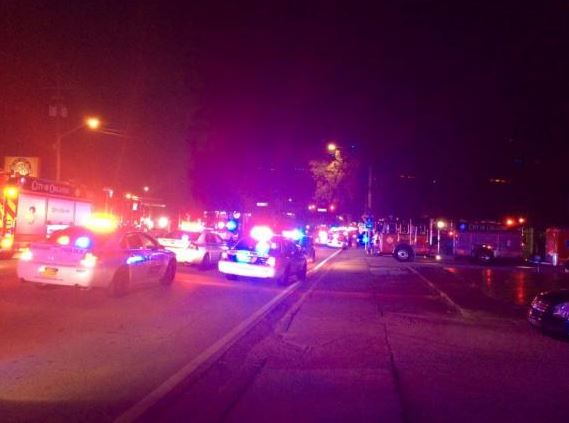
(REUTERS) The photo from Omar Mateen’s high-school yearbook is hardly remarkable – a toothy, dimpled smile with a peach fuzz mustache below a mop of black hair.
But his transformation from high-school football player to perpetrator of America’s worst mass shooting raises questions over whether authorities, and the security company where he worked, missed red flags over the depth of his apparent sympathies with Muslim extremists and whether the United States has a clear strategy to turn Americans away from radicalism.
Much is unknown about what drove Mateen, 29, to walk into a packed gay nightclub in Orlando, Florida, with a handgun and AR-15 semi-automatic rifle and open fire, killing 50 people before police stormed the club and fatally shot him. Fifty-three others were wounded, many critically.
In Fort Pierce on Florida’s southeast coast, 120 miles (195 km) from the shooting, the imam at the mosque that Mateen attended for nearly 10 years described him as a soft-spoken, regular worshipper who rarely interacted with the congregation.
“He hardly had any friends,” Syed Shafeeq Rahman, who heads the Islamic Center of Fort Pierce, told Reuters. “He would come with his little son at night to pray and after he would leave.”
Rahman said Mateen never approached him regarding any concerns about homosexuals.
Mateen was born in New York of Afghan descent but spent most of his life in Florida, attending Martin County High School in Stuart, a small city about a 20-minute drive from the Fort Pierce condominium where had most recently lived.
A classmate described him as a typical teenager who played football. An image of Mateen in his school yearbook was seen by Reuters.
Samuel King, who was one year ahead of Mateen, said the two often spoke after Mateen graduated in 2004. King worked as a waiter at Ruby Tuesday’s restaurant at Treasure Coast Square, a mall where Mateen worked at GNC, the nutrition store, he said.
King, who is openly gay, said the Mateen he knew until 2009 did not appear to be anti-gay.
“What is shocking to me is that the majority of the staff at Ruby Tuesday’s when I worked there were gay. He clearly was not anti-(gay) at least not back then. He did not show any hatred to any of us. He treated us all like the individuals we were. He always smiled and said hello.”
While at GNC, Mateen lifted weights and “got really buff,” King said, describing Mateen as gregarious and talkative in the immediate years after high school. “Something must have changed” since he last saw him, he added.
Mateen’s father, Mir Seddique, told NBC News the massacre was not related to religion.
He said his son turned angry when he saw two men kissing in Miami a couple of months ago. Mateen’s ex-wife, who spoke to the Washington Post, said her former husband was violent and mentally ill and beat her repeatedly while they were married.

The FBI twice interviewed Mateen for having suspected ties to Islamist militants. The first investigation took place in 2013 when Mateen made inflammatory comments to co-workers that indicated sympathy for militants, FBI special agent in charge Ron Hopper told a news conference in Orlando.
At the time, Mateen worked as a security guard at G4S, a British-owned multinational company that is among the world’s largest private security firms.
He joined G4S in September 2007 and carried a gun as part of his duties, the company said. It was unclear if Mateen had access to them. “He was an armed security officer,” said a spokesman, David Satterfield.
G4S provides security to federal buildings in Florida.
Mateen was investigated and interviewed twice but the FBI was “unable to verify the substance of his comments,” Hopper said.
In 2014, Hopper said, Mateen was investigated and interviewed again, this time for suspected connections to Moner Mohammad Abu-Salha, an American citizen who became a suicide bomber in Syria in 2014.
Hopper said Mateen’s contact with Abu-Sallah was minimal and it was deemed that “he did not constitute a substantive threat at that time.”
The FBI interviews highlight problems the United States has faced in extinguishing homegrown extremism even as U.S. terror-related arrests escalate.
In 2015, at least 71 people were charged in jihadi-related cases, the most for any year since Sept. 11. More than 250 Americans have joined or tried to join extremist groups in Iraq and Syria, the House Homeland Security Committee estimated in September.

REUTERS
Hopper said Mateen was not under investigation or surveillance at the time of Sunday’s attack.
He said Mateen called during the massacre to pledge allegiance to Islamic State, also known as ISIS, which in recent years declared a caliphate over large swaths of Iraq and Syria. But the depth of that commitment is unclear.
One U.S. counterterrorism official said there was “no evidence yet that this was directed or connected to ISIS. So far as we know at this time, his first direct contact was a pledge of bayat (loyalty) he made during the massacre,” said the official, referring to the call moments before the shooting.
Mateen also mentioned the Boston Marathon bombers during the call, which he made 20 minutes into the shootings, authorities said.
Mateen’s former wife said she met Mateen online about eight years ago and decided to move to Florida to marry him, according to the Washington Post.
“He was not a stable person,” she said. “He beat me. He would just come home and start beating me up because the laundry wasn’t finished or something like that.”
Mateen had a Florida firearms license that expired in 2013 and a state permit to work as a security guard, according to public records. He was registered as a Democrat.
City, state and federal officials were searching Mateen’s apartment in the Woodlands condominium building in Fort Pierce and had told other residents to evacuate.








